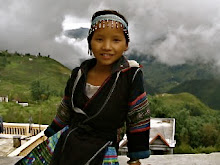The world has shrunk. We don’t have to take a voyage to Africa to explore the forests of Gabon, or the streets of Johannesburg. We’ve got Google Earth! I get calls from my friend hitchhiking through Ireland, and emails from another doing conservation work in the DRC. My shirt was made in Vietnam; my pants in Russia. For my morning smoothie, I owe thanks to the people of Ecuador, South Africa, and Mexico.
Ironic, though, isn’t it? For while the distance between us all has narrowed, it’s also grown so large, it seems at times that we’ve lost touch all together. Who actually stitched together my hoodie? Is she working 15-hour days in a country where her hopes for the future mean nothing? That chai latte – did it come at the expense of pristine rainforest acreage? Were families kicked off their native land to create that soy farm? Somebody, somewhere, sprayed something on my tomatoes, the mattress you just bought, the blanket you wrap your child in. What, I have no idea. How will all those chemicals we’re exposed to affect our bodies after 30 years of constant, unavoidable exposure?
I’m fortunate. I live in a city where the words local, sustainable, fair-trade, and organic are part of the vernacular. Having grown up in Ohio, and lived all over the US, however, I can say that these words are rarely spoken in most parts of the country. The vast majority don’t stop to think about how the chicken in our sandwich was raised, the environmental cost of our coffee, or the violation of human rights by the company who brought us our veggies.
This ironic disconnect moves beyond our kitchens and clothing stores. Despite the media access we have, and the ease with which we do business across borders, Americans’ geographic and cultural knowledge is sorely lacking. A 2006 survey conducted by National Geographic of young adults in the United States (ages 18-24) shows that only 37% can find Iraq on a map of the Middle East, a mere 59% correctly identified the Amazon Rainforest as being in South America, and 74% believe English is the most widely spoken language (it’s Mandarin). Furthermore, 50% of those surveyed felt it wasn’t necessary to know where countries in the news were located, or to be able to speak a foreign language. (National Geographic-Roper Public Affairs 2006 Geographic Literacy Study)
This lack of geographic awareness and cultural interest is evident in our corporate business practices and political policies. The hyper-ethnocentricity of those pushing for globalization – the view that worldwide adoption of American political, social and economic structures would benefit all – is glaringly obvious in our foreign relations and government spending. Its results have come back to haunt us.
Take the US Department of Defense, for example. It allocates less money to social science research than any other department (aside from the Smithsonian, who operates on a significantly smaller budget). Nearly all of this money is put towards the development of new technologies and weaponry, rather than conducting social science research. Nor is there any coordination of the social science research conducted by different agencies. The number of Foreign Area Officers (those with the language skills, and intimate local and regional knowledge) is also very limited (http://www.usip.org/fellows/reports/2007/0510_mcfate.html, January 23, 2008). If we’re to be occupying foreign countries in an attempt to build peaceful relations and assist in the creation of just governments, shouldn’t we try to understand the people with whom we’re working?
Nowhere in the world is this lack of concern for other cultures and social systems so flagrantly displayed as in Baghdad’s Green Zone. Perhaps the greatest example of the arrogance inherent in our cultural isolation, is this 10km2 irrigated desert oasis - fortified by 12ft. cement walls, armored fencing, and protected by machine guns. Within its walls are villas, bars, and fast-food restaurants (serving, yes, pork); women out for their daily run in shorts and tank tops; children selling pornographic DVDs to soldiers (Paul Hawken, Blessed Unrest). The occupation carries on as if it were “a little America embedded in the heart of Baghdad,” irrespective of the Muslims both within, and outside of, these walls (William Langewieche, The Atlantic, Nov. 2004).
Type in “anti-American sentiment” into Google, and the 1st page alone will show article results claiming it’s on the rise in Asia, the Middle East, Africa, Latin America, UK, and Russia. Given the fact that our military, our culture, and our corporations are invading even the remotest corners of the globe without regard to the long-standing traditions, beliefs, and local knowledge held by those we are overtaking, should we be surprised?
Our daily actions have a detrimental impact on villages, families, and ecosystems, both at home and abroad. The ever-growing corporations that we purchase the vast majority of our products from are smothering the traditional knowledge passed down over generations, choking out healthy ecosystems, and creating global dependency amongst people who were once self-reliant. It is here that another irony arises: while we have become dependent upon Asia for cheap labor, the Middle East for oil, and Amazonian peoples for their botanical knowledge used in our pharmaceuticals, we have made little effort to listen to their cries, meet their needs, or consider the validity of their perspectives. We may have the world at our fingertips, but I wonder if we aren’t groping in the dark.
Saturday, February 2, 2008
Subscribe to:
Posts (Atom)
.jpg)


